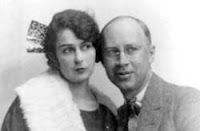Prokofiev on the Train
by Kevin Bartig
 |
| The Prokofievs in Cuba, March 1930. cubanow.net |
Two days into the journey, Prokofiev described an unusual event in his journal: “In the evening a telegram came from Gloria Swanson’s film studio: they want to confirm that I’m on the train. A commission? Or do they simply want to film me exiting the train in Los Angeles?” He joked with Lina that Swanson surely wished to engage their photogenic son, Sviatoslav. They had to wait for an explanation until they arrived at their hotel, where they received a memo from one of the actress’s associates. It explained that Swanson was “very much interested in music of the modern trend” and wished to consult Prokofiev “in connection with a new motion picture, being prepared for production.” The invitation stirred Prokofiev’s curiosity—he wrote in his journal that it was “splendid and smelled of money”—and he and Lina agreed to have breakfast with the actress the next morning.During their meeting, Prokofiev learned that the film in question was What a Widow!, a comedy starring Swanson as a wealthy widow pursued by unwelcome suitors. Swanson explained that her financial backer, the Boston banker George Kennedy, was a great fan of Prokofiev’s music and hoped the composer would write the film’s score. Prokofiev recorded nothing about the commission’s musical requisites or the film’s subject in his journal, instead jotting down strong impressions of his surroundings: Swanson was “so beautiful and so famous that you don’t know how to approach her,” and worked not simply in a studio, but in a veritable “cinematic town.” He also felt “naïve” when Swanson learned that he had never seen a sound film and escorted him to an impromptu showing. The resources and glamour of America’s “cinematic town” made their first, but not last, impression on Prokofiev.
Ecerpt from Composing for the Red Screen: Prokofiev and Soviet Film (Oxford UP, 2013).
- YouTube fan collage for What a Widow!
- See also Simon Morrison, Lina and Serge: The Love and Wars of Lina Prokofiev (Houghton Mifflin Harcout, 2013) and BBC World News feature.
Kevin Bartig is assistant professor of musicology at the Michigan State University College of Music. He earned his MA and PhD degrees from the University of North Carolina at Chapel Hill.


